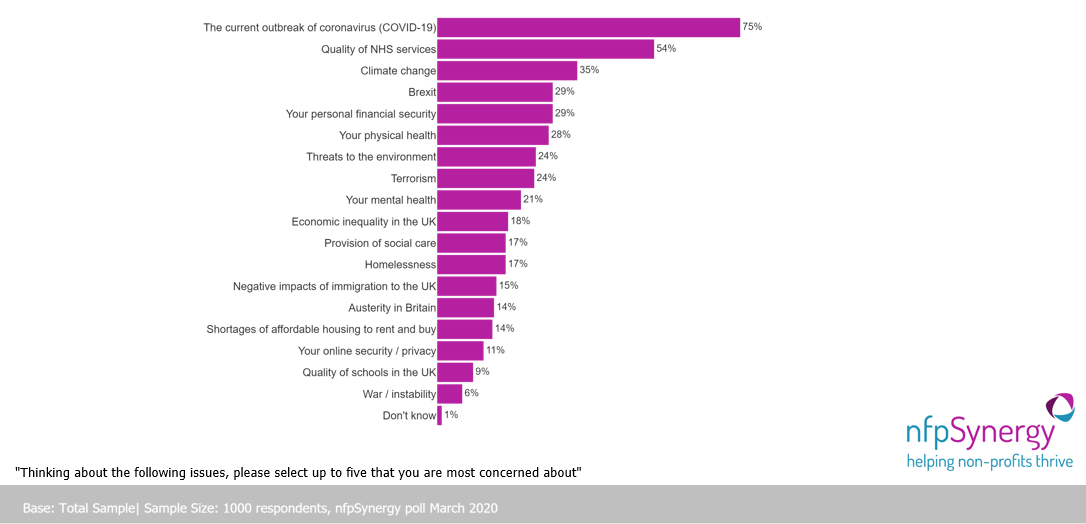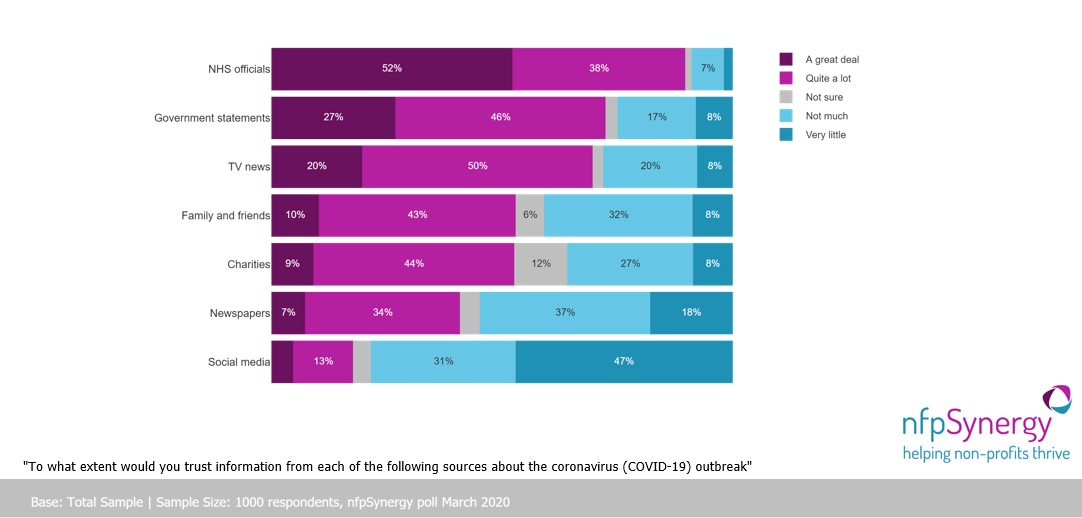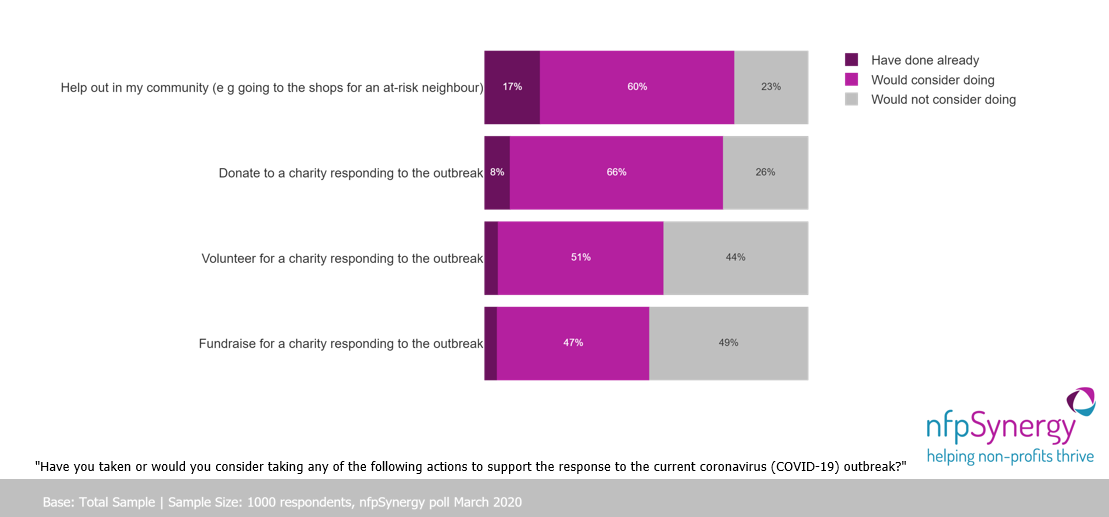Source: https://nfpsynergy.net/blog/covid-19-coronavirus-charity-sector-survey
March 2020
As the coronavirus outbreak restrictions really kicked in last week, we quickly realised from talking to our clients that there was a need for research and insight to explore what this would mean for charities. To try and address this gap, we consulted with the charities we work with and asked them what they would like to know, in order to run a short poll with the general public. We were blown away by the response from our clients, with a huge range of interesting and important topics being raised. Unfortunately, we were only able to include a handful in the context of a short (10 minute) poll of the public, but we are looking at a number of ways we can solve this, including through our regular Charity Awareness Monitor surveys of the public.
One solution we are looking at is to run regular omnibus-style surveys for charities who are interested in asking their own questions related to their cause, work or brand throughout the duration of the coronavirus crisis. If this is something that might be of interest to you, please do get in touch with your account manager or cian.murphy@nfpsynergy.net so we can know if there is enough interest out there to run another wave. We would aim to run this at the lowest realistic cost we can, donating our time for free, as we know these are unprecedented times for the sector and want to be able to help any way we can.
The results of the poll (carried out Friday 22nd March to Tuesday 24th March – 97% of responses were before the announcement of lockdown on the evening of Monday 23rd March) were fascinating, so we have decided to make them available to the sector as a whole in the hope that they might be of some use in guiding the difficult decisions that people will have to make at this time. The results are summarised here, but for those looking to explore the full dataset, including filtering by demographics, an interactive dashboard is available for free here.
The first thing to note, which will surprise no one, is that the public as a whole are extremely concerned about the coronavirus (COVID-19) outbreak. When we asked them to choose their top concerns from a prompted list, fully 75% chose the outbreak as one of their most concerning issues. By comparison, in our most recent wave of the Charity Awareness Monitor, the most concerning issue was the quality of NHS services, chosen by 57% of people. While most issues (such as housing and education) have become less pressing to the public during the crisis, concern levels have held up for respondents’ physical and mental health and financial security, as well as climate change, interestingly.
Issues of concern

When we dig further into attitudes towards the virus, we can see that it is having an effect on the mental health of the general public, with 65% agreeing that they are “personally very anxious” about the outbreak. 70% believed the government should introduce stricter legal measures and 87% intended to stay in their local area over the coming months. Many are worried about their jobs and livelihood, and just 43% are confident they will stay well throughout the outbreak. There is also, however, a small core of people who are unconcerned – 29% believe that society is overreacting the outbreak.
Messaging around the impact of the virus has been heavily centred on the impact on older people and those with underlying health conditions. Therefore, it is no surprise that when we ask people to think about how concerned they are about the impact of the virus on a number of groups, these two come top of the list with 82% extremely or very concerned about the impact on older people, and 81% feeling the same for people with underlying health conditions. The message has seemingly also got through about people with cancer and heart disease, with these two groups also registering high levels of concern (76% and 73% respectively). Perhaps more worryingly, concern levels are lower for those living with diabetes (61%), despite this condition being one of the highest risk factors for the disease. At the other end of the scale, comparatively few are concerned about the impact of the outbreak on pets (17%) or prisoners (15%).
It is vital during this outbreak for the public to have sources of information that they can trust. With this in mind, we asked respondents how much they would trust information from a range of sources. While 90% would trust information from NHS officials, and 73% from government statements, charities fared a little worse at around half of the public (53%) considering their information trustworthy – around the same as family and friends. This may be a concern for charities as they try to inform the public of the impact of the outbreak for their beneficiaries. Encouragingly however, charity donors were more likely than the public as a whole to trust information from charities – 59% vs 43% of non-donors.
Trusted sources of information

While many of the charities we spoke to work in a cause directly related to the virus (e.g. older people or specific health conditions), others were concerned that donors might be put off donating to their cause over the short term because it was not connected. As such, we asked respondents whether they would consider donating to charities working in a range of different sectors over the coming months. By comparing this to the sectors that people usually report as being their favourites in our Charity Awareness Monitor survey, we can get an idea of the potential impact of the coronavirus outbreak on causes supported.
Cancer remains top of the list at 30% (43% selected it as one of their favourite causes in the most recent Charity Awareness Monitor survey), while other health and medical causes comes in second at 26% (22% choosing it as a favourite cause in CAM). Older people is in third place at 25%, significantly up on its usual position in our favourite causes question (in Q4 2019, 16% of respondents listed it as one of their favourite causes). Causes with less of an immediately obvious connection do not, however, appear to be less likely to garner support; 7% said they would be willing to support an overseas aid and development charity (compared to 7% saying it was a favourite cause in Q4 2019). Figures also compare well for environmental (16%) and refugee (5%) charities. For charities working in these sectors, the challenge will be to clearly articulate why your work remains relevant in a changed world.
When we asked respondents to think of charities working directly on responding to the outbreak, there were few standouts, with 66% unable to think of a single one. Overall, the British Red Cross was the most mentioned charity, chosen by 7% of respondents, followed by Age UK on 5% and Oxfam on 4%. It seems that charities have not been seen to be at the forefront of the public response to the crisis.
Nevertheless, there is an appetite for supporting charities at the current time. While just 8% of respondents had already donated to a charity responding to the outbreak, 66% were willing to consider doing so. Similarly, 51% would consider volunteering while 47% would consider fundraising for such a charity. Significantly higher numbers of people had already gotten involved in helping out in their community without the involvement of a charity – 17%, while a further 60% would consider doing so.
Charitable engagement

In terms of what the public want to see charities doing during the crisis, there is a clear preference for concrete action in the here and now. By far the clearest thing that the public think would be helpful for charities to do is provide day to day support for at risk people (64%), followed by funding or carrying out medical research (41%) and providing volunteers at hospitals (40%). Much further down the list are providing advice and information (27%) or campaigning on behalf of vulnerable beneficiaries (13%). Encouragingly, 57% of the public believe that charities should continue to engage in fundraising with the public.
Many charities are naturally concerned about the impact of the outbreak on fundraising, particularly when the economic impact of the virus really begins to hit home. This is also something the public are concerned about, with nearly half (49%) expecting their income to decrease over the next few months. Despite this, just 25% expect to decrease the amount that they give to charity over the coming months, compared to 18% expecting to increase. In times of crisis, the public are aware of the need for charities; this perhaps suggests that charitable giving is not likely to be first on the list of cutbacks.
If you have found this research useful, or would like to know more about potential future research of this kind please do get in touch with us – leave a comment below, or email your account manager (if you have one!) or cian.murphy@nfpsynergy.net. Remember, you can always explore the full dataset here.
The nfpSynergy team has dispersed around the country to isolate with family and loved ones. Obviously, our office in London is closed, but we remain well, are adjusting to working at home, and our new, changed world. If you would like to speak to a specific member of staff ,you will find our email addresses on our specific staff pages on the 'Our team' section of our website.



Comments